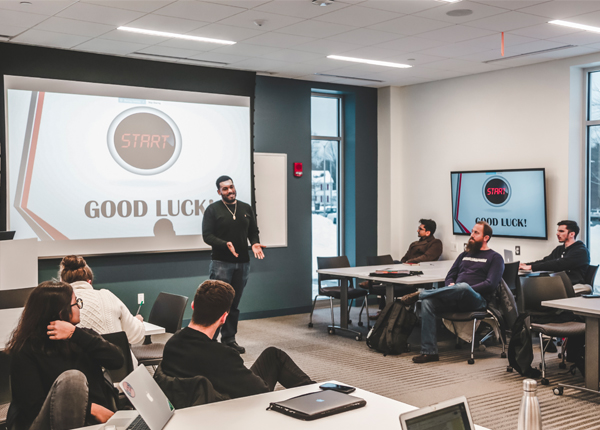
The entrepreneurial studies major at the Barney School of Business is a hybrid experience that emphasizes the practical application of theory taught during class lectures. Students learn to address real problems encountered by the owners of real businesses. As a core course for the program, ENT 314–The Principles of Entrepreneurship translates into client-specific consulting projects that provide students with hands-on experience.
Upon graduation, an entrepreneurial studies student will have a complete understanding of how an economic enterprise is constructed. The various components of a business come together under the banner of a company strategy. Therefore, an entrepreneurial studies major spans all areas of the traditional business curriculum: management, marketing, finance, accounting, and law. We emphasize a systems approach.
Because entrepreneurship impacts all aspects of our society, ENT 314 is a course encouraged throughout the University of Hartford. As a result, enrollment covers a wide range of majors, such as dance performance, media and journalism, communication, liberal studies, illustration, mechanical and civil engineering, arts and sciences, architecture, and music. We find that diverse backgrounds introduce diverse viewpoints about entrepreneurship. In ENT 314, students are involved in consulting projects for small businesses, analyzing their industry, competitive landscape, and internal operational problems, and coming up with suggestions for improvements. Students immediately apply theories they learn in class to practice.
To provide some insight into the nature of the projects, we would like to present some examples of our past classes. Two examples are traditional external-to-Barney clients, while the third is an internal-to-Barney client. In this manner, our curriculum spans both entrepreneurship and intrepreneurship.
Spring 2020
Some of the businesses that participate in ENT 314 are already taking advantage of Barney’s entrepreneurial resources like the Entrepreneurial Center and Women’s Business Center (EC-WBC). Impact Training, an EC-WBC client and minority-owned business, participated in the spring 2020 class. Impact Training is a local sports and wellness organization, founded by former athletes Steve Samuels and Chris Prescott, that provides physical fitness and academic programs to empower the greater Hartford community. The business was looking to strengthen its brand presence and clarify its key differentiator and value to customers and potential investors. The student team of Amaal Rahman ’22, Dhyan Mistry ’22, DeRohn Mitchell ’22, Romain Boxus ’20, and John Contino ’22 provided a fresh perspective on the company’s business model, target market, and competitive position, as well as much-valued strategic recommendations.
Fall 2020
In the fall of 2020, a team of five students, composed of Sam Gottsegen ’20, Sokari Macharry ’21, Aaron Schlosser ’22, Milan Williams 21’, and George Zell ’22, worked with a local entrepreneur to implement a strategy for a coffee shop opening in Simsbury, Connecticut. Entrepreneur Amy Sheehan has operated a successful consulting business for years and noticed a need in the Simsbury community for a warm and cozy atmosphere where folks can spend time. The Coffee Shop provides such a space for people to use as they like—as an office, as a coffee shop, as a place to see neighbors or to just sit and read a book. The students observed entrepreneurship in action, learned how the entrepreneur implemented a strategy and suggested actions for improvement.
Another fall 2020 team of six students, composed of Yoanny Brito ’21, Sean Cooney ’22, Briosha Hewitt ’22, Hunter Marks ’22, Tyler Rice ’22, and George Serrano ’21, engaged with UHart’s Entrepreneurial Center to identify a wildly different world that has evolved around a well-established entity that has maintained its productivity and efficiency throughout the global pandemic. The Entrepreneurial Center facilitates the growth of new ideas by providing education, guidance, and connections to the greater Hartford entrepreneurial ecosystem. The team learned how this business model operates and discussed emerging opportunities in the face of new challenges—for entrepreneurs who engage with the Center and for the Center itself.
Overall, a hybrid course structure yields multiple benefits. Students get to observe the real-life manifestation of topics discussed within the textbook and obtain a ground-level perspective of a particular business and a particular strategy. Students also understand how to identify and analyze an external environment in relation to that strategic position. By interacting directly with the clients, students learn more about how and why people pursue an entrepreneurial effort and start a venture (including all the challenges). Also, students learn to work in teams and to meet hard deliverable deadlines.
For us at the Barney School, this means a healthier entrepreneurial studies program. Our explicit effort is to integrate the Barney School deeper into the greater Hartford entrepreneurial ecosystem and to pave the way for students from different colleges across the University to become successful in life!